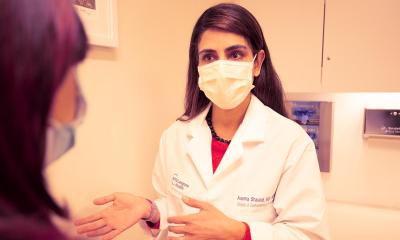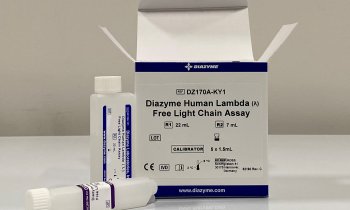
Image source: Adobe Stock/Crystal light
News • Prevention measure scrutinised
Colorectal cancer: colonoscopy screening not as effective as previously believed
A randomized study, known by the acronym NordICC – Northern - European Initiative on Colorectal Cancer - shows colonoscopy screening reduces the risk of colorectal cancer by 18 percent. The reduction is much smaller than experts previously assumed.
The NordICC study is now published in the New England Journal of Medicine (NEJM). It will also be presented at UEG week in Vienna. The United European Gastroenterology Week is the leading congress for gastroenterology in Europe and gathers over 14,000 participants every year.

Image source: Karolinska Institutet; photo: private
Colonoscopy does not appear to be as effective as previously thought in terms of colorectal cancer prevention. According to the results of the NordICC-study, it may not even perform better than screening with fecal tests, says Louise Emilsson, docent at the Department of Medical Epidemiology and Biostatistics, Karolinska Institutet, and national Swedish principal investigator of the study.
Before this study was published, experts assumed that screening with colonoscopy had significantly better effect than screening with fecal tests. Fecal tests are used in colorectal cancer screening programs in many countries, including Sweden. Other countries have introduced screening with colonoscopy based on the fact that researchers via observational and modelling studies estimated that up to nine out of ten cases of colorectal cancer could be prevented with a colonoscopy screening. With fecal tests, similar models has estimated the effect to be two to three out of ten.
In the NordICC study, the researchers investigated the extent to which colonoscopy screening actually prevents colorectal cancer. Overall, 1.2 percent of those randomized to no screening were diagnosed with colon cancer during ten years, compared to 0.98 percent in those offered screening. This means the risk of colorectal cancer decreased by 18 percent among the participants who were offered colonoscopy screening. Furthermore, 455 colonoscopies were required to prevent one single case of colorectal cancer. In being a fairly invasive and costly procedure (a colonoscopy requires preparation, so-called bowel prep with laxatives, and a 30-45 minute examination of the bowel with a camera inserted via the rectum), 455 procedures to prevent one case of cancer is certainly a disappointing number, Louise Emilsson concludes.
Colorectal cancer mortality was also found to be lower than expected. Only three in a thousand died of the disease within ten years, regardless of whether they were offered screening or not, and thus, there was no significant difference between the groups in terms of mortality. The low mortality rate is however encouraging and likely caused by significantly improved treatment options over the past ten years.
Source: Karolinska Institutet
10.10.2022








